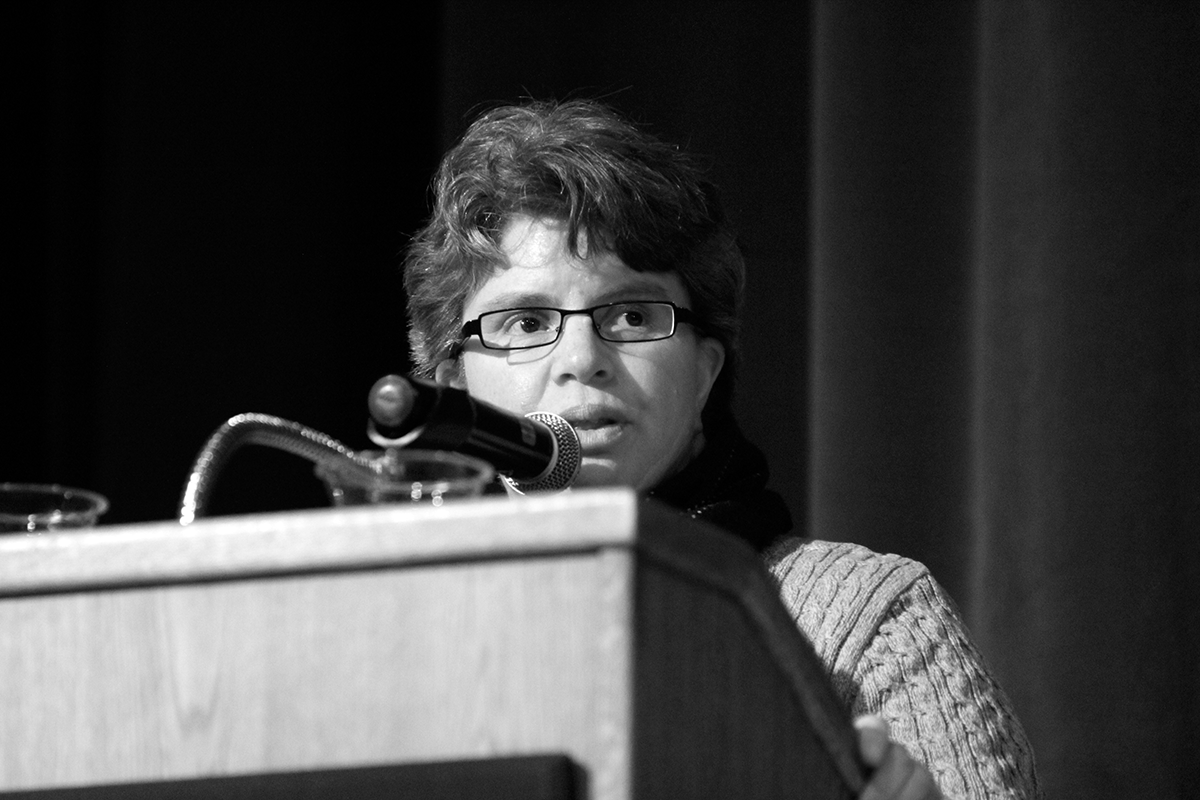
by Gabriela Martínez, Associate Professor, School of Journalism and Communication
I am honored to have served as the associate director of the Center for the Study of Women in Society for the past three years (2012-2015). CSWS has been, for me, one of the most intellectually nurturing places on campus, a place where I was allowed to explore and learn about the significance and complexities of running a research center at a university.
I encourage and invite new colleagues and graduate students at UO to visit CSWS both physically, at its offices on the third floor of Hendricks Hall, and online, by going to http://csws.uoregon.edu. You also can attend events at CSWS, such as Noon Hour Talks and Graduate Student Coffee Hours, to become familiar with opportunities for intellectual growth and academic advancement offered by the center. CSWS welcomes faculty and graduate students from across disciplines pursuing research on topics supported by CSWS’s mission: Generating, supporting, and disseminating research on the complexity of women’s lives and the intersecting nature of gender identities and inequalities.
My own research and creative work has benefited from the intellectual space that CSWS provides, which gave me the opportunity to meet colleagues from across disciplines through the research interests groups, or RIGs. I’ve been active for many years in the Amerícas RIG, and the experience of collaborating with this group of outstanding scholars has enriched my life as a faculty member at the university and contributed to my research and creative work.
Long before I took on the associate director position, I became involved with CSWS as an affiliated faculty member. I then served on the advisory board, and in fall 2012 was chosen as the CSWS associate director.
My experience as associate director has been enriching at various levels. The position required me to organize and oversee the committees that select awardees for the CSWS Jane Grant Dissertation Fellowship, the CSWS Graduate Student Research Grants, and the CSWS Faculty Research Grants. I have been exposed to and have learned about the wide variety of important research our graduate students and colleagues are conducting on diverse topics that center around women and gender issues.
Throughout the academic year 2012-2013 I had the special privilege to help organize a milestone event, the CSWS 40th Anniversary Celebration, which took place in November 2013. Additionally, during the academic year 2013-2014, CSWS offered a variety of activities to acknowledge the faculty founders of this research center, the work produced for the last forty years with the support of CSWS, and the dynamic spirit of all current and formerly affiliated faculty engaged in research that influences various disciplinary fields.
In addition, the job as associate director gave me the chance to see the important role a research center plays in the life of the university, its relationship with the university’s administration, and how it engages with the broader community. The experience I gained provided me with insight that I otherwise may not have experienced solely as an affiliated faculty member; thus, I am grateful for the opportunity.
I am also thankful to the staff with whom I worked at CSWS—particularly to Alice Evans and Peggy McConnell. Without their constant support much of my work and that of others at CSWS wouldn’t be possible. And last, but not least, major thanks to Carol Stabile and Michael Hames-García under whom I served as associate director during their directorship of the center.
I look forward to continuing my involvement with CSWS as an affiliated faculty and RIG member, and I hope to continue seeing major productivity coming out of this invaluable place. I make a strong call to colleagues across campus and disciplines to take on the various opportunities CSWS offers, including that of becoming associate director or director, as these positions rotate over time. I believe such service offers a great chance to learn and to enrich one’s career. It also offers an opportunity to contribute to the ongoing production and growth of excellent research on women and gender domestically and internationally.
As I sign off, I am happy to welcome colleague Sangita Gopal, associate professor of English, as the new associate director for the center.
—Gabriela Martínez, associate professor in the UO School of Journalism and Communication, is an internationally award-winning documentary filmmaker who has produced, directed, or edited more than twelve ethnographic and social documentaries. Her early documentary work includes Ñakaj, Textiles in the Southern Andes, Mamacoca, and Qoyllur Rit’i: A Woman’s Journey; her most recent work includes Media, Women, and Rebellion in Oaxaca; and Keep Your Eyes On Guatemala, among others. In addition to her expertise in documentary production, Martínez is a scholar who specializes in international communication and the political economy of communication. Her research focuses broadly on the study of telecom and media. The intersections between telecom and media ownership, culture, policy, transnationalism and global circulation of content are some of the topics at the core of Martínez’s research. Furthermore, she focuses on the study of human rights and social movements, and the relationship of these to media content production and distribution.
While Martínez’s primary geographical area of expertise is Latin America, she looks at and weaves historical, political, cultural, and economic connections highlighting the long-standing connection of this region to other countries and continents around the globe, and in doing so, she analyzes the implications of such connections. She is the co-creator of the Latino Roots in Oregon Project, a faculty/student– and grassroots-led historical digital repository.

